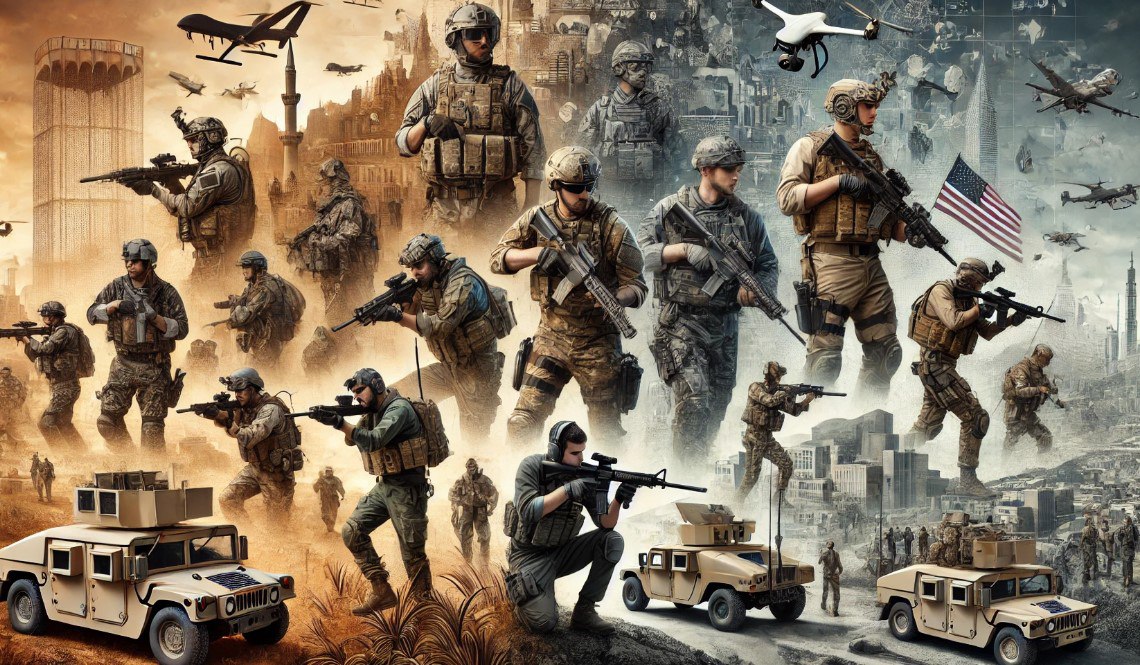Beyond The Stereotypes: What Do Mercenaries Do In Today’s Wars?
As long as there has been war, there has been a history of mercenaries- soldiers for hire that are paid to fight for a foreign army. Mercenary history is filled with stories of freelance warriors that impacted kingdoms and countries.\ Some historical mercenaries include: So exactly what is a mercenary soldier? The dictionary defines them […]
By Catherine Shannon
June 21, 2024

As long as there has been war, there has been a history of mercenaries- soldiers for hire that are paid to fight for a foreign army. Mercenary history is filled with stories of freelance warriors that impacted kingdoms and countries.\
Some historical mercenaries include:
- Italy’s 14th century White Company, led by English knight Sir John Hawkwood. He rallied a hodgepodge of multi-national adventurers whose skills became legendary. At various times, The White Company fought both for and against the Pope and the city states of Milan and Florence. During slow times, they raided various towns for extra cash.
- The Swiss Guard who are today known as protectors of the Pope and the Vatican. But between the 15th and 19th centuries, the Swiss Guard had a fearsome reputation as the best contract troop that money could buy. They mastered their use of pikes and halberds with ruthless deadly effect.
- WWII’s Flying Tigers who were contract fighter pilots fighting the Chinese to protect a crucial Burmese supply road from Japanese attack. These US pilots (quietly recruited with President Roosevelt’s approval), flew their famous shark teeth painted planes to gobble up a record 296 Japanese airplanes and 1300 riverboats.
So exactly what is a mercenary soldier?
The dictionary defines them as professional soldiers hired to serve in a foreign army. Known as professional soldiers, guns for hire, soldiers of fortune, freelance fighters, or mercenaries, some have come from backgrounds as pilots, spies, war veterans, covert operators, bodyguards, military advisors or adventurers.
Today Private Military Companies (PMCs) or Private Military and Security Companies (PMSCs) continue to offer their mercenary armies for hire in the business of war. These private companies provide armed combat or security services for financial gain. Their military personnel have no particular patriotism, national allegiance, or philosophy that controls them. Soldiers for hire are loyal only to the company that pays them, and support whatever client that hires their company.
What does a mercenary do?
Private Military Companies (PMCs) and their hired military contractors/ mercenaries supply many invaluable services. Some functions that mercenaries do:
- Primarily give military support for the armed forces of various countries.
- Maintain peacekeeping efforts and humanitarian assistance.
- Protect vital infrastructures in high-risk areas.
- Provide security for commercial shipping or businesses.
- Combat poaching or smuggling.
- Offer bodyguard/security services for VIPs/key government officials.
- Counter narcotics operations.
Private military contractors (known as mercenaries) specialize in direct offensive military services, usually in unstable combat areas. PMCs are often supplemented/overlapped by private security contractors or PSCs that typically only offer defensive, protective or bodyguard security services for commercial or governmental interests. The terms PMCs and PSC are often confusingly used interchangeably despite the distinction. PMCs used in military offensives are what most people think of as soldiers of war or mercenaries.
Is Mercenary Work Legal?
Some ask if mercenary work is legal? Yes, such work usually is. Mercenary is a misleading term when used for legitimate private military contractors working for legitimate private military companies. Those so-called mercenaries primarily work for private military companies (PMCs) that are hired by governments, large companies operating in conflict zones, and UN agencies. For instance, the Pentagon awards billions every year to federal contracts, under which the use of PMCs falls.
Is Being a Mercenary Illegal?
Due to many negative controversies, the question “Is being a mercenary illegal?” keeps reappearing. Since anyone with enough money can rent fighters, private guns with little accountability can easily get involved with dark activities. Guns-for-hire can be fueled by greed, and achieve military results without adhering to any human rights rules. Controversies involving mercenaries have included accusations of sex/drug trafficking, torture, rape, and murder.
Some examples of private military company controversies:
- Blackwater’s 2007 killings of 17 civilians in Iraq’s Nisour Square led to increases in accountability put on PMCs.
- US defense contractor L-3 Services was accused of the torture of Abu Ghraib prisoners, eventually paying out a $5.8 million settlement to 71 inmates.
Legitimate PMCs are key players for governments or entities that want to extend their influence or protect global interests- and are legal, with profit motives that do not overshadow ethics. Using actual mercenaries with no accountability is banned by international laws.
Is the World Now Ready to Privatize Peace?
In June of 1998, then UN Secretary-General Kofi Annan addressed an annual conference in the UK. He thought that private security firms, like those that had recently helped restore the elected president in Sierra Leone, could provide the UN with desirable rapid reaction capacity. Although he had considered hiring a private firm during the Rwandan refugee crisis in Goma to separate fighters from refugees, he had concluded at the time that “the world may not be ready to privatize peace.” Annan’s reasoning back then has clearly become a foregone conclusion. The world is now not only ready but has actually dramatically increased its use of PMCs and mercenaries in global conflicts.
“The United States has developed a dependency on the private sector to wage war, a strategic vulnerability. Today, America can no longer go to war without the private sector.”
Sean McFate, former mercenary and author of “The Modern Mercenary”
The modern warfare of many countries now depends heavily upon the use of contracted security. To illustrate this increased dependance, during WWII the US contracted 10 percent of its armed forces. During the Iraq and Afghanistan wars in 2009/2010, the US use of military contractors increased to 53% and 56% respectively.
Using private military companies in warfare continues to be attractive to countries because it enables them to:
- Sidestep political constraints.
- Increase their force in other countries.
- Expand military operations that do not have to be reported to their citizens.
- Minimize actual loss of life of their own troops by using contractors (whose deaths are not factored into casualty counts).
Efforts have been made to regulate private military companies, but mostly on a national, not international basis. The US has legislation such as the Special Maritime and Territorial Jurisdiction Act, the Patriot Act, the Military Extraterritorial Jurisdiction Act, and the Uniform Code of Military Justice to control contractor activities overseas. But these laws do not apply to foreign mercenaries. The 1996 Russian Criminal Code Article 359 outlaws mercenary activities by prohibiting civilians from accepting rewards for fighting abroad. Of course Russia has increasingly used PMCs anyway, notably in their war on Ukraine. Since Russian PMCs are not legally registered organizations and do not pay taxes, they do not officially exist.
So global regulations over PMCs are unlikely to happen anytime soon, considering the resistance from Security Council members (such as Russia). It is likely that the use of private military companies will continue to grow throughout the world.
For better or worse, the role of mercenaries has become integral in today’s wars. As the world’s global landscape increases in chaos and conflicts, private military contractors and their mercenaries have an important place to fill in contemporary combat.
Related Posts
Business Growth
Thinking of starting a security company? Don’t fall into the franchise trap. Discover why launching your own brand with support from The City Guards is the smarter, more profitable path. No franchise fees. No royalties. Just real tools, training, and guidance from former security CEOs.
By Michael Y. Daniels
May 17, 2025
Security Guards
I really enjoy doing dead-end work for my unhelpful bosses, making no real money at it, and never getting ahead…” Said no one ever. You are someone that has long dreamed of running your own security guard company. You know you can do security work better than what you’ve seen out there- doing things your […]
By David
March 30, 2025
Business Growth
Learn how to cultivate long-lasting customer relationships in the safety patrol industry. Find out how to create a trustworthy environment, improve communication, and deliver first-rate service to win the trust and loyalty of your customers.
By David Kerolles
July 1, 2023





